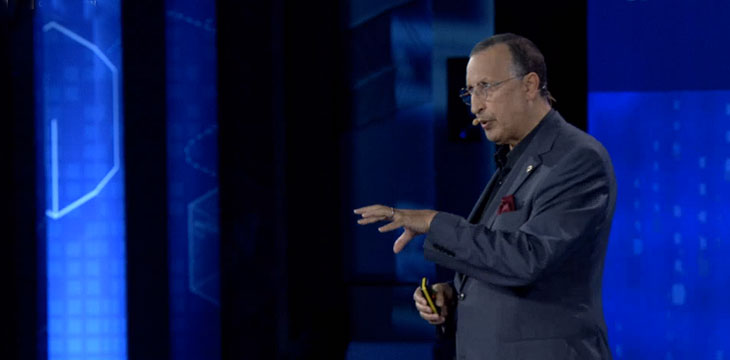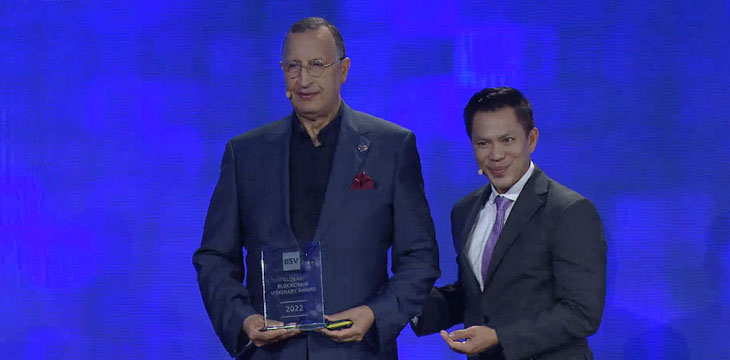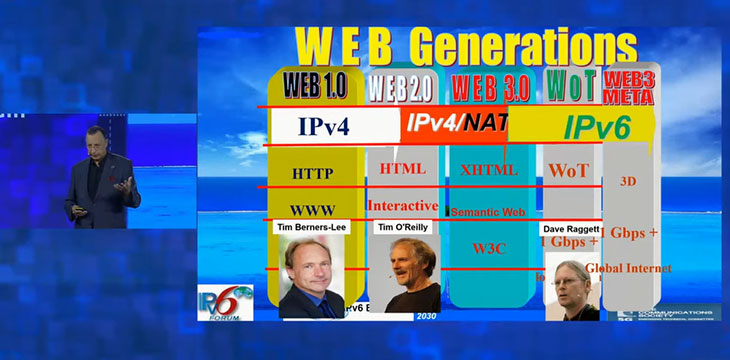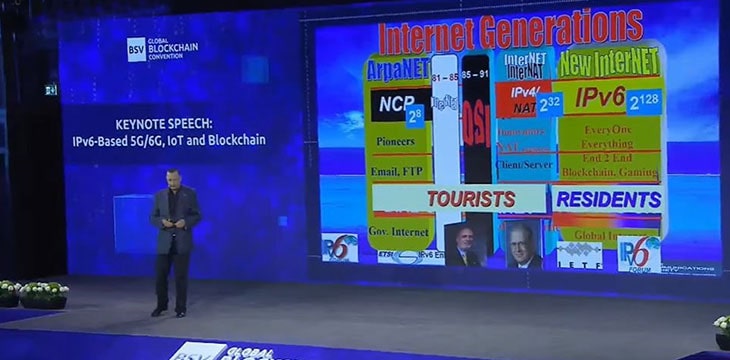|
Getting your Trinity Audio player ready...
|
https://youtu.be/dE3Vsbo1NPs
One of the keynote speakers at the BSV Global Blockchain Convention is Latif Ladid. He’s a world-renowned tech leader, the Chair of the 5G World Alliance, and the Founder of the IPv6 Forum. In his presentation, Ladid tells the audience—both in person and virtual—about the power of the IPv6 protocol and BSV blockchain.
A brief history of the internet
Ladid opens by telling us that he was first in Dubai in 1992 when they moved from analog networks to digital. He was back once again in 2002 to talk about IPv6, and now, 20 years later, he’s back to take a big step for the internet, attending the BSV Global Blockchain Convention to tell us how IPv6 and blockchain will revolutionize the world.
Ladid then gives a brief history of the internet. He tells us how ARPANET began as a small network. Most computers were used for meteorology in those days, and few thought that large-scale computer networks would catch on. However, the few mainframes that existed back then soon became many more, and many computers joined the growing network.
By 1981, DARPA started promoting the internet—all the while, many governments tried to stop it, fearing that it was too open. Even the U.S. government feared this, but ultimately, they couldn’t stop it. We all know the rest of the story; the internet grew to be the global phenomenon we’re all familiar with today.

Transitioning from IPv4 to IPv6
Ladid is the founder of the IPv6 Forum, so he’s uniquely qualified to speak about this subject. He tells us how the internet protocol most of us use today is IPv4 and that it doesn’t have the ability to generate enough unique IP addresses for every human, let alone every device. However, IPv6, the next internet protocol, does. He explains how there are only enough IPv4 addresses for big servers, a consequence of which is that we don’t exist individually on the internet. However, with IPv6, every person and device can have a unique IP address. This will have profound consequences for the Internet of Things, peer-to-peer communication and transactions, and how the internet works.
Ladid explains that when everyone has a unique IP address, true peer-to-peer communication becomes possible, allowing us to bypass centralized servers like those controlled by Meta. He notes that around 2 billion people are using it already. China is leading the way, with over 400 million people using IPv6. The United Arab Emirates has approximately 4 million users on IPv6, which is around 50% of its population, and the U.S. government wants to move to pure IPv6 by 2025—showcasing just how important this protocol will be to the future of everything.
Giving an example of why everyone needs to have a unique IP address, Ladid explains how, right now, if the police want to catch someone who has committed a crime online, they’ll need to round up thousands of people who used that same IP address and find the right one. This will change when everyone has their unique IP address.

How IPv6 will underpin the Internet of Things
Ladid outlines how IPv6 will enable the Internet of Things (IoT) to flourish. The IoT is a hot topic in the tech world right now, and it’s only going to become more prominent as more smart devices connect and begin communicating. IPv6 will be essential to the IoT. Without it, there won’t be enough IP addresses for each device.
One benefit of IoT utilizing IPv6 is its positive impacts on data integrity and transparency, he says. Right now, big cloud computing companies have to do regular backups, centralizing data on their servers. This has all sorts of implications for data integrity, privacy, and other factors. IPv6 will shake how all of this works up, revolutionizing the internet and allowing us to largely bypass centralized servers and communicate directly for the first time.
How blockchain technology fits into all of this
Ladid expresses his belief that blockchain will be deployed everywhere. It will touch every aspect of our lives and will play a role in every industry. He says that digital cash can become a reality, and he notes that it’s already a culture in some countries, such as Kenya, which has a large number of people using M-Pesa.

Wrapping up, Ladid speaks about how he connected with Bitcoin’s inventor Dr. Craig Wright and how they’ve been collaborating and having fun since. He says that he sent Dr. Wright an email, and he replied within two hours, leading to speeches, invitations, and a budding friendship. Like Dr. Wright, he advocates for education, playing within regulations to win over governments, and standardizing blockchain technology. Since he believes that it will eventually underpin everything, he says that it’s important to make sure everyone understands its implications and that all stakeholders have a say in the standardization process that’s ongoing right now.
Watch the BSV Global Blockchain Convention Dubai 2022 Day 1 here:
https://www.youtube.com/watch?v=ggbZ8YedpBE
Watch the BSV Global Blockchain Convention Dubai 2022 Day 2 here:
https://www.youtube.com/watch?v=RzJsCRb6zt8

 03-01-2026
03-01-2026 




